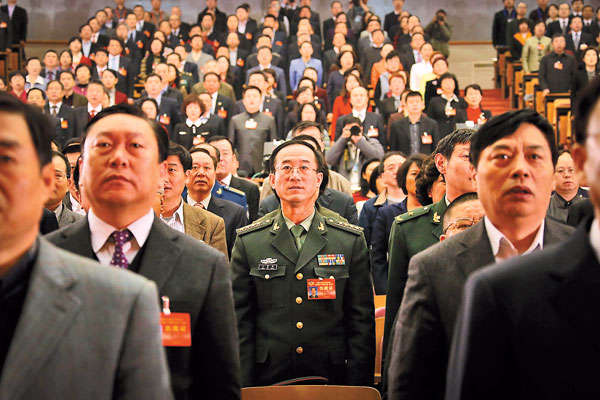Pollution, traffic hot topics for advisers
Updated: 2013-01-22 07:49
By Zhao Yinan and Zheng Xin in Beijing (China Daily)
|
||||||||
Beijing's lawmakers, political advisers meet to come up with solutions
Air pollution and traffic congestion are likely to top the agenda when Beijing's lawmakers and political advisers gather for their annual meetings this week.
The lawmakers' seven-day meeting, scheduled to open on Tuesday, will see the capital's new mayor chosen by deputies. Leaders of the city's legislature, government organs and the judicial system will also be elected.
Political advisers gathered on Monday for their annual plenary meeting of the Beijing committee of the Chinese People's Political Consultative Conference (CPPCC), a political consultative body that offers advice to the government.
An Lijuan, a deputy to Beijing People's Congress, said she will urge the government to spend more money on easing traffic jams. She said she believes urban development can help solve the problem.
"Although the city has a blueprint for urban development, the plan has not been implemented well. I think each district should develop its own advantage, such as education and high technology, instead of blindly seeking comprehensive expansion on urban construction," An said, adding that a well-planned development blueprint would also improve air quality by reducing car exhaust emissions.
Liu Weilin, also a deputy in Beijing, said he believes air pollution and traffic jams are likely to be the main items of discussion. He said he will suggest the government match its economic capability with the construction of urban facilities.
Liu Zihua, a political adviser in Beijing, said he will push the government to tackle the parking difficulties for car owners.
Despite restrictions on car purchases, the number of vehicles has exceeded 5.2 million in Beijing and parking has turned into a headache for many residents, especially those living in older communities, he said.
When old residential areas, such as the hutong areas, were being planned, parking was not taken into consideration, so today car owners are forced to park on sidewalks and even in front of access roads, which poses a serious threat as fire engines are blocked from entering the hutong, Liu said.
"The hutong is already very narrow, and cars make it even worse," he said.
"It's necessary for the government to conduct detailed research and focus on the areas with serious parking issues," Liu said. "The government can come up with more automated underground garages in these areas to ease pressure on parking."
Beijing is the fifth provincial region to have opened its annual "two sessions", which collectively refers to the meeting of the legislators and advisers. Most provincial areas have announced plans to hold the meetings this month.
Acting governors for eight provincial regions are likely to be chosen as leaders for their regions at the upcoming sessions, including mayors of Beijing and Shanghai and provinces such as Zhejiang, Jilin and Shanxi.
Lawmakers and advisers will be able to offer policy suggestions to local governments by submitting proposals and motions and approving budgets allocated to different issues.
Liu Shanying, a political science researcher at the Chinese Academy of Social Sciences, said provincial political events are likely to focus on issues of great public concern.
"Topics concerning people's livelihoods, such as social security, housing prices and food safety, will continue to be at the center of discussions," he said.
Recent hot topics on the Internet, such as the debate over whether the children of migrant workers should be allowed to take the national college entrance exam in major cities, are likely to again gain public attention, especially in provinces of coastal China which have more migrant workers, he said.
Contact the writers at zhaoyinan@chinadaily.com.cn and zhengxin@chinadaily.com.cn
Cao Yin contributed to this story.
Related readings:
Anti-pollution plan gets mixed reviews
Beijing to restrict cars on roads in polluted days
Pollution hits Shanghai but should clear in a day
Pollution triggers breathing woes
Pollution may make economy splutter
Beijing police handled 115,000 traffic offenses
Chinese drivers question new traffic rule
More time needed to test new traffic rules
Taking traffic regulations seriously
Traffic violations may hurt credit

 Li Na on Time cover, makes influential 100 list
Li Na on Time cover, makes influential 100 list
 FBI releases photos of 2 Boston bombings suspects
FBI releases photos of 2 Boston bombings suspects
 World's wackiest hairstyles
World's wackiest hairstyles
 Sandstorms strike Northwest China
Sandstorms strike Northwest China
 Never-seen photos of Madonna on display
Never-seen photos of Madonna on display
 H7N9 outbreak linked to waterfowl migration
H7N9 outbreak linked to waterfowl migration
 Dozens feared dead in Texas plant blast
Dozens feared dead in Texas plant blast
 Venezuelan court rules out manual votes counting
Venezuelan court rules out manual votes counting
Most Viewed
Editor's Picks

|

|

|

|

|

|
Today's Top News
Boston bombing suspect reported cornered on boat
7.0-magnitude quake hits Sichuan
Cross-talk artist helps to spread the word
'Green' awareness levels drop in Beijing
Palace Museum spruces up
First couple on Time's list of most influential
H7N9 flu transmission studied
Trading channels 'need to broaden'
US Weekly

|

|








